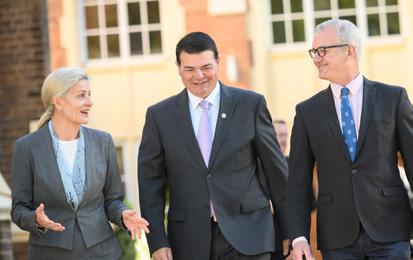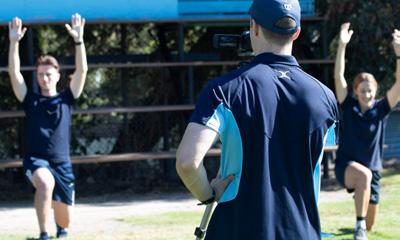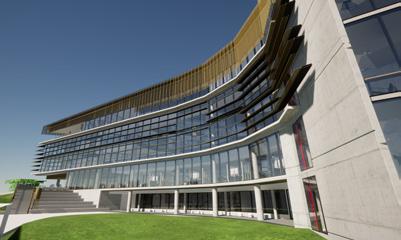
4 minute read
Innovating for success
Innovation has played a fundamental role in the success of Brisbane Grammar School since its foundation more than 150 years ago.
The inaugural Board of Trustees established the School with innovation at the forefront of their minds. Chairman Sir Charles Lilley – a journalist, politician and judge – was unwavering in his vision and efforts for a comprehensive system of free education in Queensland. Championing liberal and innovative views, Lilley used his political influence to embrace many causes, particularly education.
As Premier he abolished school fees, making Queensland the first colony to introduce free primary education in 1870. He was hailed by many as the father of Queensland’s system of free, compulsory and secular education.

An innovator in education, Sir Charles Lilley was the inaugural BGS Chairman.
In the decades that followed, successive Boards and Headmasters at BGS balanced tradition with a constant drive for innovation. In response to rapid technological change, innovation has accelerated.
Current Headmaster Anthony Micallef has overseen the appointment of an Executive Director of Educational Innovation on the BGS Senior Leadership Team – giving innovation a permanent seat at the table. Ms Jacqui Zervos assumed the role two years ago after more than a decade as Head of Middle School. The position has been vital to developing and implementing the School’s new method of teaching and learning, called Effective Thinking Cultures (ETC). ETC has transformed learning at BGS, placing students at the centre of their own success.

Jacqui Zervos is Executive Director of Educational Innovation at BGS. She is pictured with Headmaster Anthony Micallef and Deputy Headmaster – Teaching and Learning Steve Uscinski.
At its core, ETC focuses teaching and classroom learning on developing the quality of students’ thinking: that is, their command of content; their use of content to create significant meaning; and developing productive learning habits – the ability to plan, monitor, review and strategically adjust the approach to learning. Through this process, students’ capacity to take responsibility for their learning is nurtured. They learn to identify the most effective ways to tackle problems and modify their thinking to suit the context.
A new Middle School subject – Applied Thinking – is being introduced in 2021 for all BGS students in Years 7 and 8. The innovative new foundational subject will lay the platform for ETC, creating independent and self-regulated learners for life.
The ability of the School to adapt and innovate has never been more apparent than in 2020. While many schools around the country struggled to adapt to home-based learning, BGS used the enforced COVID-19 lockdown to implement new ideas and improve teaching and learning for students. Transitioning the entire curriculum online in days, BGS teachers found new ways to engage with their students in virtual classrooms during the home-based learning period.
Over the past few years, the School’s data team has captured a significant amount of information from students, parents and teachers to inform change. Home-based learning provided further important data. One of the positives to come from the period is a restructured timetable in 2021.
The new timetable will ensure all lesson times are equal length and introduce a block of structured time each day for students to consolidate their learning and prepare for upcoming lessons. The consolidation period will allow students time to slow down their thinking, organise and review notes, reflect, make links, identify gaps, collaborate with peers, and seek clarification from their teacher if needed.
All BGS programs developed innovative ways to connect with students during home-based learning. The Cocurricular program kept boys engaged through the introduction of GrammarFit – online fitness classes for students. The Student Wellbeing program introduced GrammarWell, an online wellbeing portal, to help students cope with isolation.

GrammarFit ensured boys stayed active during the home-based learning period.
The capacity to adapt and innovate has been required in several other areas of the School this year. BGS hosted its first Virtual Open Day in July, replacing the physical Open Day due to COVID restrictions. The live-streamed event on social media took BGS into homes all over the world, with over 2700 people watching the virtual event.

Virtual Open Day replaced the usual physical Open Day in 2020, showcasing a BGS education to prospective families around the world.
The School’s first Virtual Boarding Night followed in November with a panel of current boarders and boarding parents joining the Director of Boarding and Director of Enrolments to explain the benefits of BGS Boarding to a domestic and international audience. The School also worked with the Old Boys’ Association to deliver two virtual networking events for Old Boys, focusing on Science and Technology in May and Law in September.
BGS continually reviews and develop its programs, practices and facilities. The STEAM Precinct – Science, Technology Engineering, Art and Mathematics – due for completion in 2023, will be the most ambitious and advanced project in the School’s history. The precinct will be a hub for ideas, innovation, and educational and social interaction.
STEAM represents a progressive shift in teaching and learning, promoting the sharing of ideas across science subjects, art and humanities. It will represent the School’s commitment to forward thinking and shape the way BGS boys are educated for decades to come.
Brisbane Grammar School aspires to be the best school for boys in Australia. Innovation at all levels can make that vision a reality.

The BGS STEAM Precinct will be the most innovative building on campus. Hands-on learning will be possible within the precinct – from artistic and technological exploration to designing, prototyping, 3D printing, complex biological dissections and earth science.








